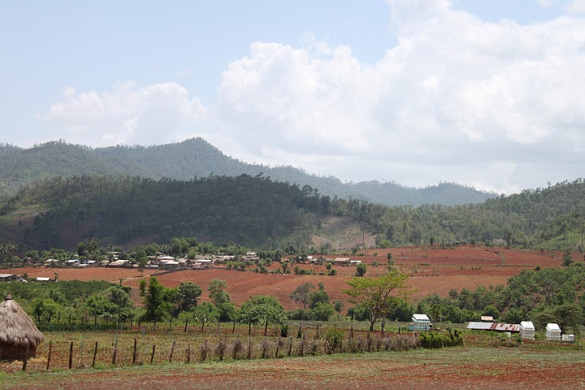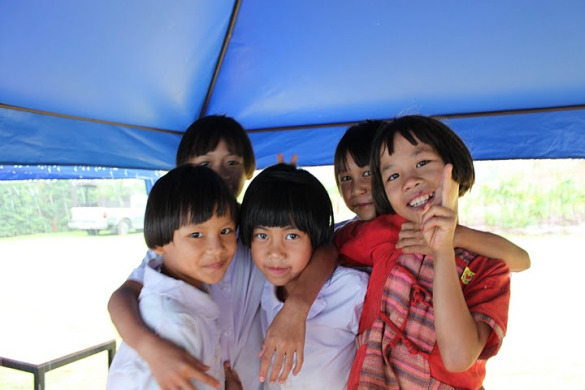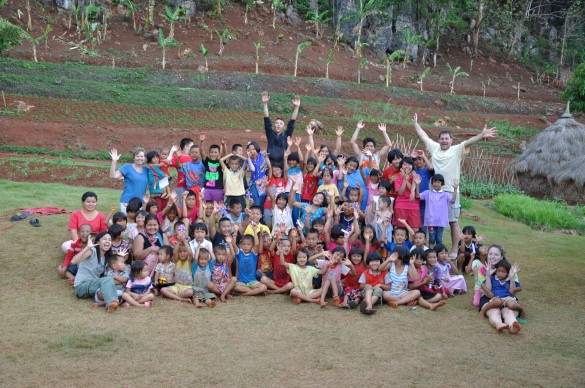Thailand was always on my “must see” list, but I figured it would be a while before I got to see it. The 20 or so hour flight definitely had me scared, so other destinations became my top priority. But it was always in the back of my mind. “Wouldn’t it be great if I could travel there for free?” I thought unrealistically.
Call me selfish, call me sheltered, but I had never thought about combining volunteering and my travels. It was usually all about me. So when my mom mentioned a mission trip with her church that was already paid in full, I thought, “Why not?” It was the summer after my college graduation and I had nothing better to do. I thought about the temples I would see, the great photo ops, but not the kids I would be working with. Mistake number one.
The wake up call came the day we drove two hours north of Chiang Mai to a tiny village called Muang Na, where the mountains suddenly appear out of the clouds and dominate the view. It is within sight of the Burmese border and is home to Hilltribe, mostly Lahu, and Chinese families.

I had gone to a homeless shelter in Atlanta once, but I had never experienced this type of poverty. Many of the roads were unpaved and made of compacted clay. Some of the houses were big by any country’s standards, but looked out of place next to wooden shacks that looked as if they could barely withstand a light breeze. Signs were in both Chinese and Thai and pictures of the king and queen could be found in every home.
Word spread fast that a group of farangs, or foreigners, had arrived and within minutes, 50 kids were at the gate, whispering to one another in their Thai dialects. No sooner had I sat down than a dark skinned girl with short brown hair crawled into my lap.

We were there to run a Bible camp and to teach English at the school across the street from The Door Foundation home. I interacted with kids on many occasions through the years of babysitting, teaching the same Bible camps in the states, and playing with younger cousins. But that didn’t prepare me for these kids. Not only did I not speak a word of their language, although we had a translator, but they also had more energy than I have ever seen in my life. The Lahu girls could tackle each other just as brutally as the boys. The kids would listen intently as our translator taught them Bible stories and line up quickly for lunch, which may have been their only meal of the day.
Kids would show up whether camp was going on or not. Girls as young as eight carried their infant brothers and sisters in slings on their backs. Their tired expressions were well beyond their years. The younger girls had cropped hair and were often mistaken for boys, especially when they wore tattered hand me downs. Their clothes were tied on or pinned to fit them and the one clean outfit most of them owned was a school uniform. I was also struck by how fascinated they were by my camera until my mom pointed out that most of them have probably never seen their own picture before.
They may not live in the nice suburbs or go to fancy private schools, but these kids are definitely smart. They could draw life-like pictures with colored pencils, put together puzzles in a matter of minutes and one in particular knew how to ask me for my phone number in English. They could also turn everything into a game: Chinese jump rope made from rubber bands tied together, jacks out of rocks and flip flop hurdles.

More often than not, the kids came sporting shiners and scars. I remember what it was like to be that age and I definitely don’t recall looking like I got into a street fight. Some days I felt discouraged that nothing we did would make any difference. We didn’t speak the language, none of the children showed up regularly enough to learn anything and we would be gone at the end of the week, forgotten for another year. I wanted to take these kids home with me, naively convinced they would have a better life with an unemployed American college graduate than with their own Thai-speaking flesh and blood.
Then I came to a realization. As much as we wanted them to learn about God, it was more important for them to learn about love. For me, at least. Most of them just want attention and love, which they may not get at home. Adults in Muang Na must survive by farming or by way of money sent to them from family members in the city and don’t have time to spend with their children.
These kids may not remember anything we taught them in a year. They probably won’t remember our names or what we look like. But they will remember that we came to show them love.
Photos by ruben i and Caroline Eubanks